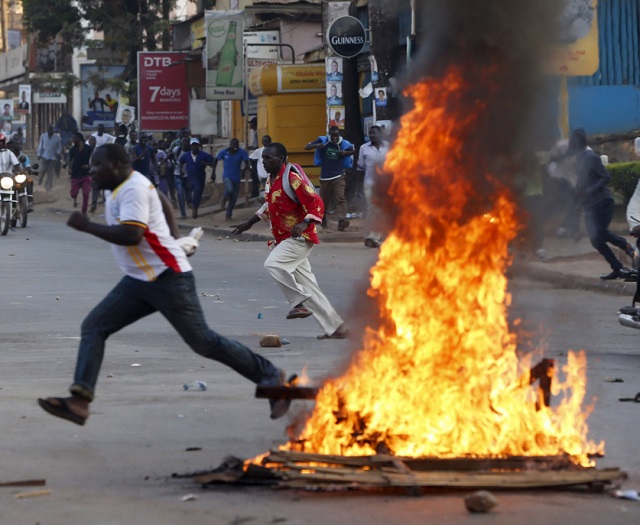
Presidential candidates, security agencies need to sign a peace pact
Kampala, Uganda | PATRICIA AKANKWATSA AND RONALD MUSOKE | Going into the Jan.14 general election, Perry Aritua, the executive director of Women’s Democracy Uganda, an NGO, has one great fear; the loss of more human life.
“An election should simply be an opportunity for citizens to choose their leaders. In most countries, it is a normal event. But here it is bloodshed,” Aritua told The Independent on Dec.10, “The loss of lives, intimidation and threats should not arise and should stop to allow citizens to play their role and enjoy their rights as envisaged in Articles 1, 29, 38 and 59 of the Constitution.”
President Yoweri Museveni who has ruled Uganda uninterrupted since 1986 is facing off with 10 other contestants in an election slated for January 14, 2021.
But the political campaigns have not been smooth for many of Museveni’s challengers with his main opponent, Robert Ssentamu Kyagulanyi of the National Unity Platform (NUP) and Patrick Oboi Amuriat of the Forum for Democratic Change (FDC), facing harassment by the security forces.
Aritua’s fear of the loss of more human life is because of the killing of people by security forces during the violent protests that followed the arrest of presidential candidate Robert Kyagulanyi aka Bobi Wine on Nov.18. He was charged with contravening COVID-19 standard operating procedures instituted by the Electoral Commission.
Official figures show that 54 people were killed that day and on Nov.19. Unofficial claims are that over 100 people were killed. No official list of the dead is available for verification. But the killings appear to have cast dark smoke over the election campaigns.
Crispin Kaheru, a local independent election expert, says all the 11 presidential candidates and security agencies need to sign a peace pact with the objective of securing a peaceful general election.
“Given the escalating circumstances, formal and informal institutions including; the heads of government organs such as the judiciary, parliament and the executive must quickly act together with other influential non-governmental actors to impress it upon the presidential candidates to take a stand against electoral violence, take a stand against impunity and injustice as well as commit to a peaceful election and judicial resolution of election disputes.”
“It is clear that we can no longer leave the role of ensuring a peaceful election to one or a few institutions. This is a shared role,” Kaheru said, “Given the tone of the presidential candidates often set for a general election, it is time we get them to sign a Peace Pact from which the entire country will make them accountable for their actions or inactions.”
Meanwhile, the Uganda Human Rights Commission is overwhelmed by the number of complaints of human rights abuse that are being reported, according to one of the commissioners; Dr. Patricia Achan Okiria.
She said many of the complaints arise from the recent brutality meted out by the security forces under the pretext of enforcing COVID-19 standard operating procedures.
Okiria said the commission appears handicapped because it does not have a substantive chairperson to constitute a tribunal to handle the human rights violations.
“But we haven’t backed down. We continue to sensitize people to participate in elections. We have trained officers, written advisories to the Election Commission on how elections should be conducted,” she said.
Okiria was addressing a gathering of human rights defenders in Kampala to mark Human Rights Defenders Day on Dec. 09.
The Uganda Law Society, in anticipation of more human rights abuses in the next four weeks, is already setting up a team of thousands of lawyers to respond and rescue detainees in need of representation during the election period.
“We have advocates on standby at various police stations in the country ready to handle cases arising from violations of people’s rights,” says Pheona Nabasa-Wall, the newly elected president of the ULS.
Nabasa said Ugandan human rights defenders are living under threat.
“We are referred to as noise makers,” she said, “Each one of us should be a human rights defender because we need solidarity to protect human rights. Human rights defenders are not noisemakers but have regard to fundamental rights.”
Nabasa said the biggest challenge the ULS is grappling with is that state actors; especially security personnel, do not know their responsibilities and ordinary Ugandans are ignorant about their fundamental rights.
“That is why ULS is working as a watchdog. We want to find a way of involving the state into the work of human rights defenders.”
At the same event, Assistant Superintendent of Police (ASP), Cornelius Beyanga, a prosecutor at the Directorate of Human Rights and Legal Affairs in the Uganda Police Force said some of their officers and men and women who “misbehaved during the recent riots” are being dealt within the standby police courts.
“It is not true the Uganda Police is not responding to public complaints of human rights abuses by some of our personnel,” he said, “We continue to sensitize and train our officers. Whoever messes up, it is their own fault and they are not spared.”
The post Defenders fear of more killings over elections appeared first on The Independent Uganda:.
from The Independent Uganda: https://ift.tt/2KrEFk8
0 Comments